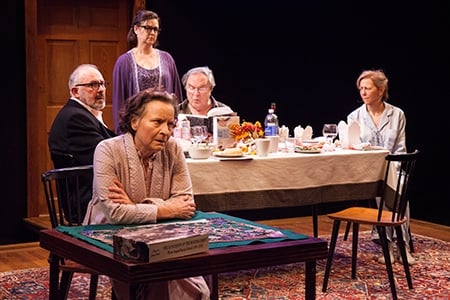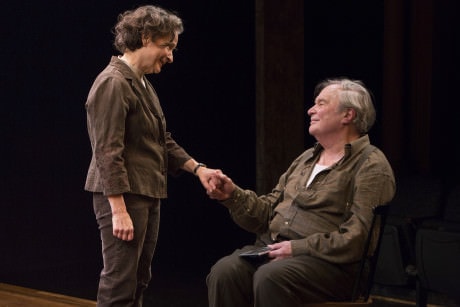One of the most frequently read quotes about Richard Nelson’s four play Apple Family Cycle comes from Ben Brantley’s article, “One Man, 10 Shows, Guvnor.” (Dec. 13, 2013, New York Times.)
Speaking of Sorry, play #3 in the cycle, Mr. Brantley writes: “Mr. Nelson’s series is quietly turning into one of the great accomplishments in American theater to date in this century.”

High praise indeed.
And indeed, after seeing Sorry, I sung Nelson’s praises as well. Its drama about the once powerful Benjamin, played by the always powerful Ted Van Griethuysen, slipping deeper and deeper into Alzheimer’s heart-rending void, a slow and inextricable death by soul-robbing memory loss, is not only constructed in a neo-naturalistic style fit for the 21st century, but it is also centers its story around one of America’s most pressing issues: the loss of memory, both personal and historical.
As memory loses its power, personal peccadilloes rise to the surface.
For a family and its members, the loss of memory becomes painful. As Benjamin slips into his void, the “Benjamin” others know goes in and out of focus. Even more difficult to endure, a new “Benjamin” appears, one dominated by his personal peccadilloes. This new Benjamin becomes, at best, hard to deal with and, at worst, a cause of dread and fear.
The personal power of Sorry lies in that deep abyss of pain into which “sorry” is the only possible reply.
For a nation and its politics, citizens without memory no longer place issues within any historical context. Issues become sound bites, and sound bites become at best opportunities for Gotcha Moments by fame-seeking journalists. When issues no longer have collective solutions, depression ensues, or violence.
The national power of Sorry lies in its Rhinebeck retreat from the world, a place of reclusion, a village where older people return like salmon, not to spawn, but to die without the fret of the cultural other, which in this case is the non-liberal.
So yes, I found the first three plays in Nelson’s cycle wonderful accomplishments. Play #4, Regular Singing–well, I thought not so grand: a bit too long for what Nelson and his characters had left to say, or better what they had left to do.
Also, perhaps, in the midst of the break between Sorry and Regular Singing, I reflected on what this family of Apples represented.
These Apples–yes, as American as Apple pie–represent America, or a least a small sliver: they represent the nonprofit-theatre-going audience.
First of all the Apples are “liberals”, of the Kennedy ilk.
They are lovers of the arts, of poetry, and of theatre in particular, and they have as bleeding of hearts as any democrats in the country.
They are educated and, as academe loves to say: “logocentric”, meaning “words” are their world: they live in language and its laws and high principles and try not to bother themselves with physical labor and its dirt.
And they are, by most the world’s standards, well off: meaning they don’t have to pinch too many pennies, or worry about a second job (or any job in some cases), and if uncle needs an expensive assisted-living facility, money is not the issue.
At the Apple’s core is oldest sister Barbara (Sarah Marshall), unmarried and the new “mom” of the family, and a public high school English teacher, who is obsessed with liberalism and JFK. When a parent complains about her blatantly liberal agenda and her principal bans a “liberal” writer from appearing in her class, she threatens to quit teaching.

The longest suffering is middle sister Marian (Elizabeth Pierotti), divorced from Andy (whose off-stage dying presence (or should I say “absence”?) fills the stage in Regular Singing). She’s a public 2nd/3rd grade school teacher. Having already lost a daughter to suicide, in Sorry Marian has a chance at happiness, a new boyfriend. In this dramatic quartet, without a satre-play ending, we expect no happiness to last.
The youngest sister, the inexplicable Jane (Kimberly Schraf), is a writer whose first, unpublished book details the history of manners. Slim and fit, she has a younger boyfriend, Tim, a struggling actor. Plus, she might, just might, be the daughter of Benjamin. Divorced, she must also be receiving alimony, for she has no job and no visible means of support.
Then there is Richard (Rick Foucheux), the lawyer–yes, DC theatre audiences are filled with lawyers as 1 out of 20 Washingtonians are lawyers (If truth be told, in New York only 1 out of 250 are lawyers; so a truly representative play in DC would probably have at least 2 lawyers). In Sorry the corporate lawyer Richard is considering a move into New York Democratic politics, i.e., Andrew Cuomo, whom the Apples inexplicably do not consider “liberal” enough.
The last two characters are actors, the previously mentioned Benjamin the great (Ted Van Griethuysen) and Tim the still-waiting-tables (Jeremy Webb), who in Sorry is off in Chicago on a low-paid acting gig. And as we all know audiences are filled with theatre people, professional and amateur and everyone in between.
In other words, with Sorry and the Apple Family Cycle instant empathy emerges between characters and audience. We know these people on stage because, for the most part, we, the audience, are these people.
There is no separation, no getting to know you, no having to let down one’s emotional guard to experience the “other”, for on this Apple stage, there is no “other”. There is only “us”.
Now, to be sure, we Washingtonians do not live in a seemingly quaint village midway between Albany and New York City, between New York’s politics and its culture/commerce; but as Washington grows and its congestion worsens, more and more people with means dream of moving to quaint villages, or at least extended visits, to escape the hubbub, the traffic, the crime and, most of all, the politics.
It’s that empathy, simple and immediate, that Sorry and the rest of the Apple plays rely on.
So if Nelson’s Apple Cycle rings true and there are no happy endings, only “regular” singing, then our dream of moving to our own “personal” Rhinebeck on the Hudson–tucked as we had hoped in a valley of apples–will bust like so many Californias.
And the gold dust in our palm will be nothing but a fool’s glitter.
Richard Nelson’s beautiful, but flawed homily to America’s theatre-going public.
The Apple Family Cycle: Sorry plays in repertory with The Apple Family Cycle: Regular Singing through December 13, 2015, at The Studio Theatre’s Milton Theatre, 1501 14th Street NW, Washington, DC. Tickets are available at the box office, 202-332-3300, and online.
Sorry and Regular Singing in repertory Sorry through December 13 at Studio Theatre, 501 14th Street NW, in Washington, DC. For tickets, call the box office at (202) 332-3300, or purchase them online.
LINKS
The Apple Family Cycle: ‘Sorry’ at The Studio Theatre reviewed by John Stoltenberg.
‘Regular Singing’ in Repertory with ‘Sorry’ at Studio Theatre reviewed by Robert Michael Oliver.





